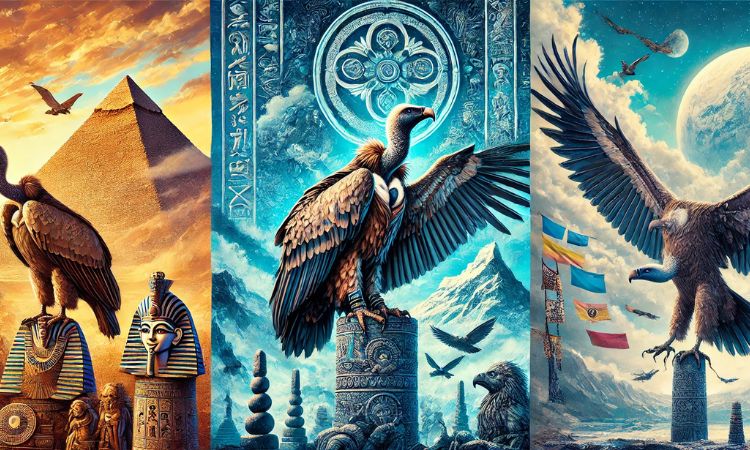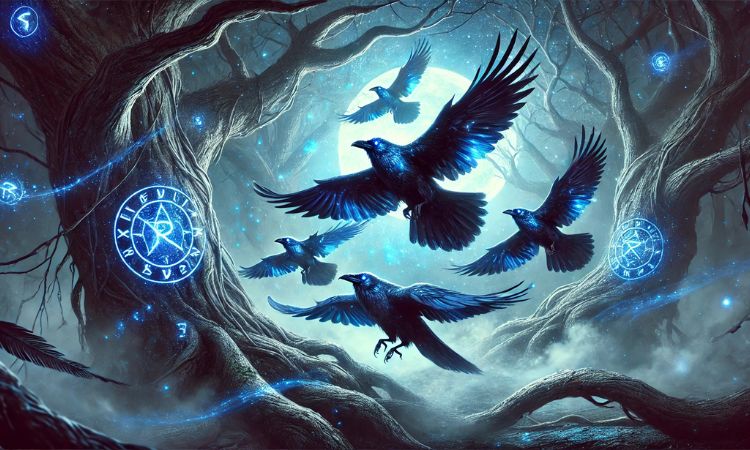Vultures are often viewed with a sense of discomfort, especially when they appear in biblical contexts. Their presence raises questions about their symbolism and whether they carry messages of doom or spiritual insight. Many people are left wondering if there’s a deeper meaning behind these birds of prey.
In the Bible, vultures are mentioned alongside images of death and destruction, which can stir feelings of fear or unease. However, there’s more to the biblical meaning of vultures than just decay. These birds appear in verses that reference larger spiritual themes, hinting at divine judgment, guidance, and renewal.
By exploring key scriptures and teachings, we can uncover what these creatures truly represent. In this article, I’ll walk you through the symbolism of vultures in the Bible and how their presence might offer spiritual lessons, shedding light on their deeper significance.

Key Takeaways
- Vultures in the Bible often symbolize divine judgment, death, and purification, reflecting spiritual consequences and the cycle of renewal.
- In Leviticus, vultures are deemed unclean, highlighting the importance of spiritual purity and adhering to divine laws.
- Vultures are also agents of divine retribution, emphasizing the severe consequences of human disobedience and disrespect.
- Their role in nature symbolizes spiritual renewal, as they cleanse decay, reminding believers of the importance of vigilance and transformation.
What Is the Biblical Symbolism of Vultures?
In the Bible, vultures symbolize different spiritual concepts, often tied to judgment, death, and purification. Let’s explore their meanings.
Symbols of Death and Judgment
Vultures in the Bible are often seen as symbols of death and divine judgment. These birds, which feed on dead animals, represent the aftermath of destruction and the inevitability of death. In Matthew 24:28, for example, Jesus refers to vultures gathering around a carcass to highlight the certainty of judgment during the end times. This image of vultures reinforces the idea that divine judgment is inescapable, linking their presence with spiritual consequences.
Unclean Animals
According to the Mosaic Law, vultures were considered unclean animals. This is outlined in Leviticus 11:13-19, where their diet of decaying flesh made them impure and unfit for consumption. This classification of vultures highlights the importance of adhering to divine laws regarding purity, both physically and spiritually. By avoiding such animals, the Israelites were following the Lord’s commands to maintain spiritual cleanliness.
Instruments of Divine Retribution
The Bible also presents vultures as tools of divine retribution. In Proverbs 30:17, for instance, it’s mentioned that vultures will peck out the eyes of those who dishonor their parents. This stark imagery serves as a warning, showing the serious consequences of disrespect and disobedience. Vultures are depicted as agents carrying out divine punishment, symbolizing the severe results of human sin.
Purification and Renewal
Though vultures are tied to death, they also play a role in purification and renewal. By cleaning up carcasses in nature, these birds contribute to the environment’s renewal. This role can be seen as a metaphor for spiritual purification, where judgment leads to a new beginning. The presence of vultures in certain biblical passages emphasizes the cleansing process, where the old is removed, making way for spiritual transformation and renewal.
Spiritual Vigilance and Awareness
Vultures, with their keen eyesight, symbolize spiritual vigilance in the Bible. Their ability to detect carcasses from great distances mirrors the importance of discernment in a believer’s life. Just as vultures are always watchful, believers are encouraged to stay alert, aware of the signs around them, and recognize divine messages. This symbolism serves as a reminder to remain spiritually vigilant and discerning, aware of the Lord’s presence.
Historical Contexts
Throughout history, vultures have often been associated with war and destruction, particularly as scavengers following armies into battle. This historical context adds depth to their biblical symbolism, as they represent the aftermath of violence and the consequences of human conflict. The presence of vultures in such scenes serves as a reminder of the toll that war and sin can take, both physically and spiritually.
How Do Different Cultures Symbolize a Vulture?
Vultures hold diverse symbolic meanings across many cultures, often representing both negative and positive attributes. In some traditions, they are linked to life and protection, while in others, they embody death and decay.

In Ancient Egypt, vultures symbolized motherhood and protection. The goddess Nekhbet, often depicted as a vulture, was believed to watch over pharaohs and their people. These birds were also linked to purity due to the belief they reproduced without males, reflecting themes of birth and nurturing.
In Mesopotamian culture, vultures symbolized warfare and triumph. They are depicted in the Stele of the Vultures, where they carry the remains of fallen soldiers, emphasizing the transition of power and the purification of battlefields.
Zoroastrian traditions viewed vultures as part of their funerary rites. The dead were left on Towers of Silence for vultures to consume, symbolizing the soul’s release and preventing the earth from being defiled by the remains.
Tibetan Buddhism incorporates vultures into the practice of sky burials, where the deceased are given to vultures. This represents life’s impermanence and the natural cycle of rebirth.
Native American cultures often see vultures as messengers between the worlds of the living and the dead. Their role in cleaning up dead animals is seen as a purifying process, linking them to themes of transformation and renewal.
In many African traditions, vultures are viewed as guides for the souls of the dead. Their connection to the afterlife gives them spiritual significance as creatures that bridge two worlds.
Greek and Roman mythology also recognized vultures as symbols of fate and omens. Romans interpreted their flight patterns for guidance in important decisions, while Greeks associated them with love, given their loyalty in mating.
In modern times, vultures still hold symbolic meanings related to death and renewal. Their patience and efficiency in cleaning up carcasses also earn them respect as vital parts of ecosystems, highlighting their ability to maintain ecological balance.
What Do Different Scenarios With Vultures Symbolize?
Different scenarios with vultures often carry symbolic meanings tied to transformation, judgment, and the cycles of life. Below are key interpretations.
- Vultures Circling When vultures circle, it often symbolizes an impending change or transformation. This behavior reflects the natural cycle of life, as vultures consume dead animals and return nutrients to the earth. In some cultures, the sight of circling vultures is even seen as a positive sign, indicating renewal or the conclusion of a difficult phase.
- Vultures in Dreams Seeing vultures in a dream may symbolize a period of transition. For some, it can represent letting go of past burdens, while for others, it may signal an upcoming opportunity. The vulture’s presence in dreams often invites the dreamer to reflect on their current life stage and consider what needs to be released to grow.
- Vultures as Spirit Animals As spirit animals, vultures represent patience, resourcefulness, and the ability to adapt. They serve as guides, teaching individuals to find purpose in unexpected places and encouraging the release of what no longer serves them. Vultures as spirit animals highlight the importance of embracing change and finding strength in adversity.
- Vultures Feeding on Carcasses When vultures are observed feeding on a carcass, this scenario represents the theme of purification. In many traditions, vultures are seen as cleaners, removing the old to make way for new life. The act of feeding can symbolize the removal of negative influences or past obstacles, allowing for renewal and growth.
- Vultures Perched A vulture perched quietly may symbolize a period of waiting or reflection. This scenario can suggest the importance of patience and preparation, signaling that while transformation or action is imminent, the time to move forward has not yet arrived. It encourages mindfulness and careful consideration before making decisions.
What Are the Biblical Stories Related to Vultures?
In the Bible, vultures are often linked to themes of judgment, death, and spiritual vigilance. Below are key biblical stories where vultures play a symbolic role.
- Genesis 15:11: In this verse, Abram (later Abraham) drives away vultures from sacrifices he has prepared for God. This act emphasizes protecting what is sacred from unclean forces. The scene also highlights spiritual diligence in maintaining holiness and safeguarding one’s offerings to God.
- Matthew 24:28: Jesus mentions vultures in this passage, stating, “Wherever the corpse is, there the vultures will gather.” This imagery connects to the end times, symbolizing the certainty of divine judgment. The gathering of vultures represents an inevitable conclusion, where justice and retribution follow decay and wrongdoing.
- Micah 1:16: Micah refers to vultures in the context of mourning, advising people to shave their heads in lamentation. Here, vultures symbolize the consequences of sin, particularly death and destruction, reminding people of the sorrow that comes from disobedience.
- Prophetic Imagery: Throughout prophetic texts, vultures are used as symbols of desolation following divine judgment. They appear in visions of abandoned battlefields or cities destroyed by God’s wrath, marking the aftermath of rebellion against divine law. Their presence underscores the severe consequences of turning away from righteousness.
How Should I Respond After the Vulture Sighting?

When encountering a vulture, it’s essential to recognize its spiritual significance and respond with thoughtful reflection. The vulture often serves as a metaphor for spiritual messages and can prompt various forms of introspection and action.
First, seeing a vulture may encourage self-reflection. Vultures are known for purifying the land by consuming decaying matter, and in a spiritual sense, this can be a reminder to cleanse your own life of negative influences or sinful behavior. It’s an invitation to seek renewal, allowing you to shed what no longer serves you in pursuit of personal growth.
Next, a vulture’s presence can symbolize embracing change and transformation. Since vultures are associated with the cycle of death and rebirth, seeing one may signify the need to let go of something old to make room for new beginnings. This encounter can serve as a message to embrace upcoming changes with an open heart, recognizing that transformation leads to renewal.
Moreover, vultures soar at great heights, which can symbolize the importance of seeking a higher perspective. By taking a step back and viewing your life’s challenges from a broader angle, you can gain clearer insight into your circumstances. The vulture encourages you to rise above day-to-day concerns and focus on long-term wisdom and understanding.
Lastly, the vulture’s appearance can be a reminder of spiritual vigilance and preparedness. In biblical texts, vultures often appear in contexts of judgment and purification, reminding believers to stay vigilant in their spiritual lives. This sighting may serve as a call to strengthen your faith and ensure that you are spiritually prepared for whatever lies ahead.
When Should I Seek the Professional’s Help?
When encountering symbolic meanings related to vultures, professional guidance can offer valuable insights. Here are a few scenarios where seeking help might be beneficial:
- Persistent Negative Emotions: If the sight or symbolism of vultures causes lasting fear or anxiety, consider consulting a therapist. They can help address underlying emotions and guide you in processing these feelings in a healthy way.
- Spiritual Confusion: If vulture symbolism is causing doubt or questions about your faith, a spiritual advisor or clergy member can offer a deeper understanding. They may provide context or interpretation grounded in your religious beliefs.
- Personal Growth: For individuals aiming to use vulture symbolism to inspire personal change, a life coach or personal development expert can help channel this symbol toward achieving growth. This guidance can help you navigate difficult transformations or transitions in life.
FAQs
What God Is Represented by a Vulture?
The vulture represents the Egyptian goddess Nekhbet. She was a protective deity, particularly of Upper Egypt and its rulers. Often depicted as a vulture, Nekhbet symbolized both life and death, serving as a guardian for pharaohs and a mother figure in ancient Egyptian mythology.
Why Are Vultures Portrayed as Evil?
Vultures are often seen as evil due to their scavenging behavior and association with death. Their role in consuming carrion links them to decay, which creates a negative image. In various cultures, vultures symbolize bad omens, uncleanliness, and even spiritual decay in religious symbolism.
What Demon Is Associated With Vultures?
The demon Ipos is sometimes depicted as a vulture in demonology. He is an Earl and Prince of Hell, commanding demonic legions. Known for revealing past, present, and future events, Ipos is associated with vulture imagery, reflecting his dark and mysterious influence.
Conclusion
Vultures in biblical texts provide profound insights, symbolizing not only death and judgment but also renewal and purification. Their unclean status in Leviticus emphasizes the importance of spiritual purity, while their role in nature mirrors themes of cleansing and transformation. These birds appear as agents of divine retribution, serving as a stark reminder of the consequences of disobedience.
Despite their association with decay, vultures encourage spiritual vigilance. Their presence calls for discernment, urging believers to remain alert and reflective. Through this lens, vultures offer a deeper understanding of life’s cycles and the need for both personal and spiritual renewal.
By examining their significance, we can better appreciate the lessons they provide in scripture. This was all from my side. I hope you found this article informational. In case, you have doubts or questions, ask me in the comment section below. I would love to help you further.






